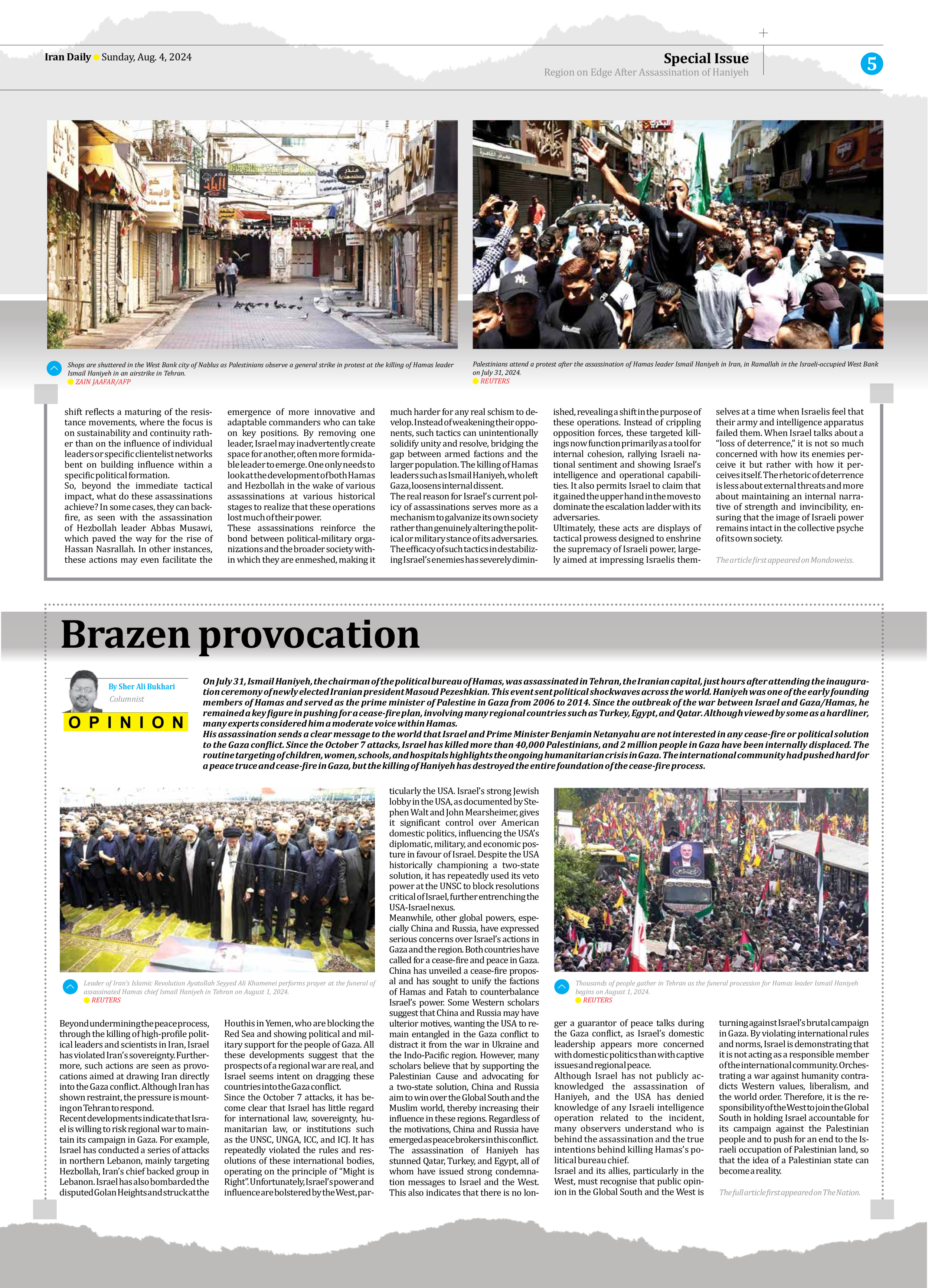
Brazen provocation
On July 31, Ismail Haniyeh, the chairman of the political bureau of Hamas, was assassinated in Tehran, the Iranian capital, just hours after attending the inauguration ceremony of newly elected Iranian president Masoud Pezeshkian. This event sent political shockwaves across the world. Haniyeh was one of the early founding members of Hamas and served as the prime minister of Palestine in Gaza from 2006 to 2014. Since the outbreak of the war between Israel and Gaza/Hamas, he remained a key figure in pushing for a cease-fire plan, involving many regional countries such as Turkey, Egypt, and Qatar. Although viewed by some as a hardliner, many experts considered him a moderate voice within Hamas. His assassination sends a clear message to the world that Israel and Prime Minister Benjamin Netanyahu are not interested in any cease-fire or political solution to the Gaza conflict. Since the October 7 attacks, Israel has killed more than 40,000 Palestinians, and 2 million people in Gaza have been internally displaced. The routine targeting of children, women, schools, and hospitals highlights the ongoing humanitarian crisis in Gaza. The international community had pushed hard for a peace truce and cease-fire in Gaza, but the killing of Haniyeh has destroyed the entire foundation of the cease-fire process.
By Sher Ali Bukhari
Columnist
Beyond undermining the peace process, through the killing of high-profile political leaders and scientists in Iran, Israel has violated Iran’s sovereignty. Furthermore, such actions are seen as provocations aimed at drawing Iran directly into the Gaza conflict. Although Iran has shown restraint, the pressure is mounting on Tehran to respond.
Recent developments indicate that Israel is willing to risk regional war to maintain its campaign in Gaza. For example, Israel has conducted a series of attacks in northern Lebanon, mainly targeting Hezbollah, Iran’s chief backed group in Lebanon. Israel has also bombarded the disputed Golan Heights and struck at the Houthis in Yemen, who are blocking the Red Sea and showing political and military support for the people of Gaza. All these developments suggest that the prospects of a regional war are real, and Israel seems intent on dragging these countries into the Gaza conflict.
Since the October 7 attacks, it has become clear that Israel has little regard for international law, sovereignty, humanitarian law, or institutions such as the UNSC, UNGA, ICC, and ICJ. It has repeatedly violated the rules and resolutions of these international bodies, operating on the principle of “Might is Right”. Unfortunately, Israel’s power and influence are bolstered by the West, particularly the USA. Israel’s strong Jewish lobby in the USA, as documented by Stephen Walt and John Mearsheimer, gives it significant control over American domestic politics, influencing the USA’s diplomatic, military, and economic posture in favour of Israel. Despite the USA historically championing a two-state solution, it has repeatedly used its veto power at the UNSC to block resolutions critical of Israel, further entrenching the USA-Israel nexus.
Meanwhile, other global powers, especially China and Russia, have expressed serious concerns over Israel’s actions in Gaza and the region. Both countries have called for a cease-fire and peace in Gaza. China has unveiled a cease-fire proposal and has sought to unify the factions of Hamas and Fatah to counterbalance Israel’s power. Some Western scholars suggest that China and Russia may have ulterior motives, wanting the USA to remain entangled in the Gaza conflict to distract it from the war in Ukraine and the Indo-Pacific region. However, many scholars believe that by supporting the Palestinian Cause and advocating for a two-state solution, China and Russia aim to win over the Global South and the Muslim world, thereby increasing their influence in these regions. Regardless of the motivations, China and Russia have emerged as peace brokers in this conflict.
The assassination of Haniyeh has stunned Qatar, Turkey, and Egypt, all of whom have issued strong condemnation messages to Israel and the West. This also indicates that there is no longer a guarantor of peace talks during the Gaza conflict, as Israel’s domestic leadership appears more concerned with domestic politics than with captive issues and regional peace.
Although Israel has not publicly acknowledged the assassination of Haniyeh, and the USA has denied knowledge of any Israeli intelligence operation related to the incident, many observers understand who is behind the assassination and the true intentions behind killing Hamas’s political bureau chief.
Israel and its allies, particularly in the West, must recognise that public opinion in the Global South and the West is turning against Israel’s brutal campaign in Gaza. By violating international rules and norms, Israel is demonstrating that it is not acting as a responsible member of the international community. Orchestrating a war against humanity contradicts Western values, liberalism, and the world order. Therefore, it is the responsibility of the West to join the Global South in holding Israel accountable for its campaign against the Palestinian people and to push for an end to the Israeli occupation of Palestinian land, so that the idea of a Palestinian state can become a reality.
The full article first appeared on The Nation.







